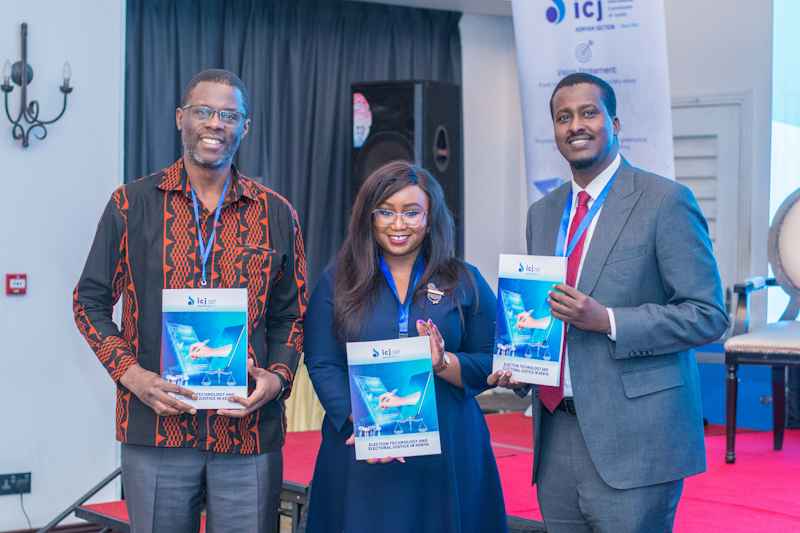By John Walubengo
The Kenyan Section of the International Commission of Jurists (ICJ Kenya) organized and hosted its Annual Jurists Conference (AJC) 2022 on the theme, “Reflections on Electoral Democracy in Africa: Trends in Judicial Decisions, Challenges, and Lessons.”
The conference provided a platform for dialogue for critical stakeholders to discuss emerging trends and challenges and harness lessons from recent elections in Africa from 2018 to 2022.
The conference was graced by the Retired Chief Justice of Tanzania, Hon Mohammed Othman Chande, the Supreme Court of Kenya Justice, Hon. Mr. Justice Mohammed Ibrahim, the Hon. Lady Justice M. Mapani-Kawimbe, Justice of the High Court of Zambia, H.E Justice Imani Aboud, President, African Court on Human and Peoples’ Rights, the eminent Dr. Eliud Wabukala, Chairperson of the Ethics and Anti-Corruption Commission, (EACC), amongst others.
The conference explored various thematic domains, including but not limited to the following:
Emerging election jurisprudence from the continent
The role of Civil Society and Amicus Curiae in election petitions
Election Integrity for political candidates
The place of technology in elections
The role of citizens in election processes and The future of African Elections
The four-day event had rich and deep insights that a single blog post would never do justice to summarise. However, we highlight some of the hot topics below.
21 Day timeline for Presidential Petitions
The Hon. Mr Justice Mohammed Ibrahim repeated what is now commonly agreed: that the 21-day constitutional restriction to receive, hear, and determine presidential elections in Kenya was too short.
Indeed, he clarified that it is a 14-day window since the petition is free to file, seven days after the election body has declared the winner.
He argued that the time constraint is punitive to all parties since it is difficult for the petitioners to compile a substantive petition with solid evidence. It is also quite demanding for the defence and other interested parties to adequately review and respond to the petitioners’ allegations.
Furthermore, he added that what is often forgotten is the double pressure the Supreme Court judges have to undergo, considering they must review all the submissions and counter-submissions from all the parties within the two-week time slot and still come up with a reasonable judgement.
Supreme Court judgments are always subject to international legal scrutiny and, ideally, should never be made under any pressure, whether time constraint or otherwise.
Whereas the need to extend the timeframe was largely accepted, some voices said it must be sensitive to the fact that in emerging economies like most of Africa, presidential elections are existential threats where the country’s economic activities ground to a halt. Giving the judiciary one extra week to determine Presidential disputes in most of Africa translates to strangling the country’s economy by one more extra week.
The threshold for nullifying Presidential Elections
Another hotly debated topic was the acceptable threshold for nullifying a presidential election.
One of the agreed-upon principles of any sound electoral system is that it must be administered in an impartial, neutral, efficient, accurate, and accountable manner.
Additionally, the election management body must ensure that the voting system deployed is simple, accurate, verifiable, secure, accountable, and transparent.
Therefore, a petitioner seeking to nullify an election aims to prove that the election failed to meet any of the above properties or attributes of a good electoral system.
However, other legal minds were of the opinion that election processes are carried out by human beings and, therefore, inherently prone to human errors and, as such, may not be as accurate, efficient, or impartial as per the letter of the law.
They argue that courts must therefore interrogate and determine whether the electoral body’s irregularities, acts of omission, or commission significantly affected the people’s will or the election results. In other words, if the irregularities do not change the results, there is no justifiable need to subject the country to another round of elections.
The role of election Technology
The Hon observed it. Retired Chief Justice Mohammed Othman Chande, Chief Justice of the Republic of Tanzania, said that technology is projected to play a central role in the African electoral processes. As a result, judicial officers, petitioners, and defense lawyers have little choice but to become acquainted with the various technologically driven electoral processes.
KICTAnet, the only accredited Election Technology Observer group that has observed the tech side of the 2017 and recent 2022 Kenyan elections, was invited to demystify electoral technology. Their representative and Trustee, Mr. John Walubengo, took to the stage and presented “Election Technology – are we over-complicating the Process?”
Highlighting the interventions that technology has made in line with the Kreigler Report to deal with multiple voter registers, ghost voters, and results from manipulation, Mr Walubengo articulated the role of the three primary tech components, namely: Biometric Voter Registration (BVR), Electronic Voter ID (eVID) and the Results Transmission System (RTS).
Participants and public members were urged to resist the temptation to return to the manual methods since that would introduce more challenges than the technology-driven electoral processes presented.
The sessions were lively and animated, and we look forward to the conference proceedings as ICJ Kenya publishes them.
The Annual Jurists Conference organized by the Kenyan Section of the International Commission of Jurists brings together members of the Bench, the Bar, and other participants from the African continent and worldwide to discuss various issues.
____________________________________________________________
John Walubengo is an ICT Lecturer and Consultant. @jwalu.
![]()




